We first found out about Praxis (a company that’s local to our US tester) when he was in search of a way to convert his BB30 Turner RFX to work with SRAM GXP cranks. Praxis kindly sent out their “conversion BB” for testing. We were impressed by it and always stoked on well made parts that provide “why didn’t I think of that?” solutions. A few months back, we stopped into their headquarters in Santa Cruz for an office tour. On our way out, we grabbed a set of their new Lyft cranks…Freakishly light, but quite stout, the carbon cranks utilize Praxis’ take on a massive forged spindle that’s proprietary to their bottom brackets. It threads right into a standard BSA threaded shell and they offer BBs for just about any configuration. Anyhow, here’s how they have held up on our daily driver…
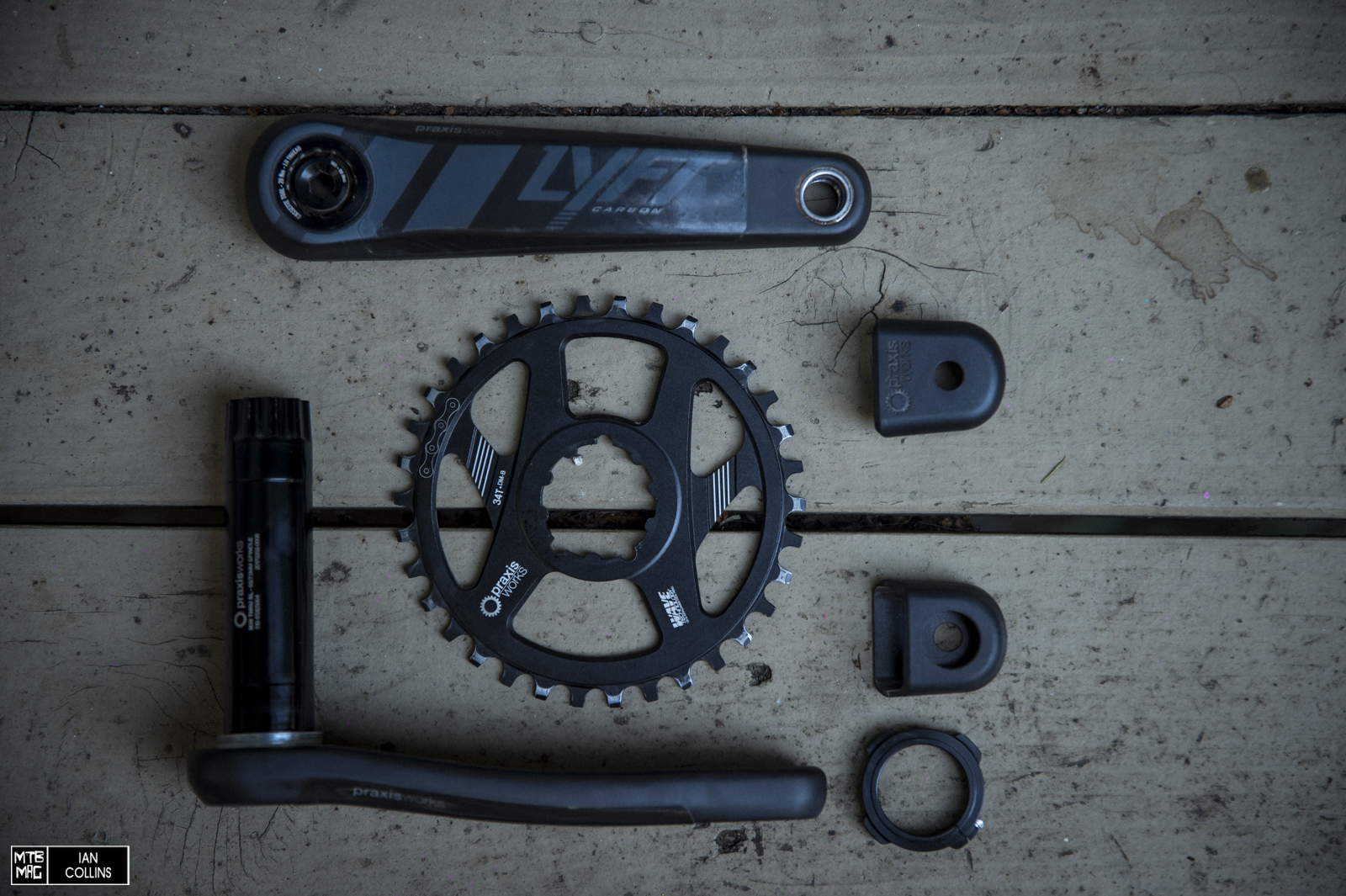
Details
- Hollow Carbon Construction
- 170mm or 175mm length
- M30 THRU Spindle for use with Praxis M30 THRU family of BB’s
- Includes a Wave Tech ring. DMA 49mm CL or DMB Boost 52mm CL
- Includes crank end protectors and die-cut arm scuff protector
- 10/11speed compatible and also SRAM 12 speed Eagle compatible
- Q-Factor 172mm
- Weight 460g +/- (175 with 32T) / **Our 170mm w/ 34T weighed 456 grams**
- $545 US – as tested including 34T chainring, threaded BB & BB tool
- 2 year warranty
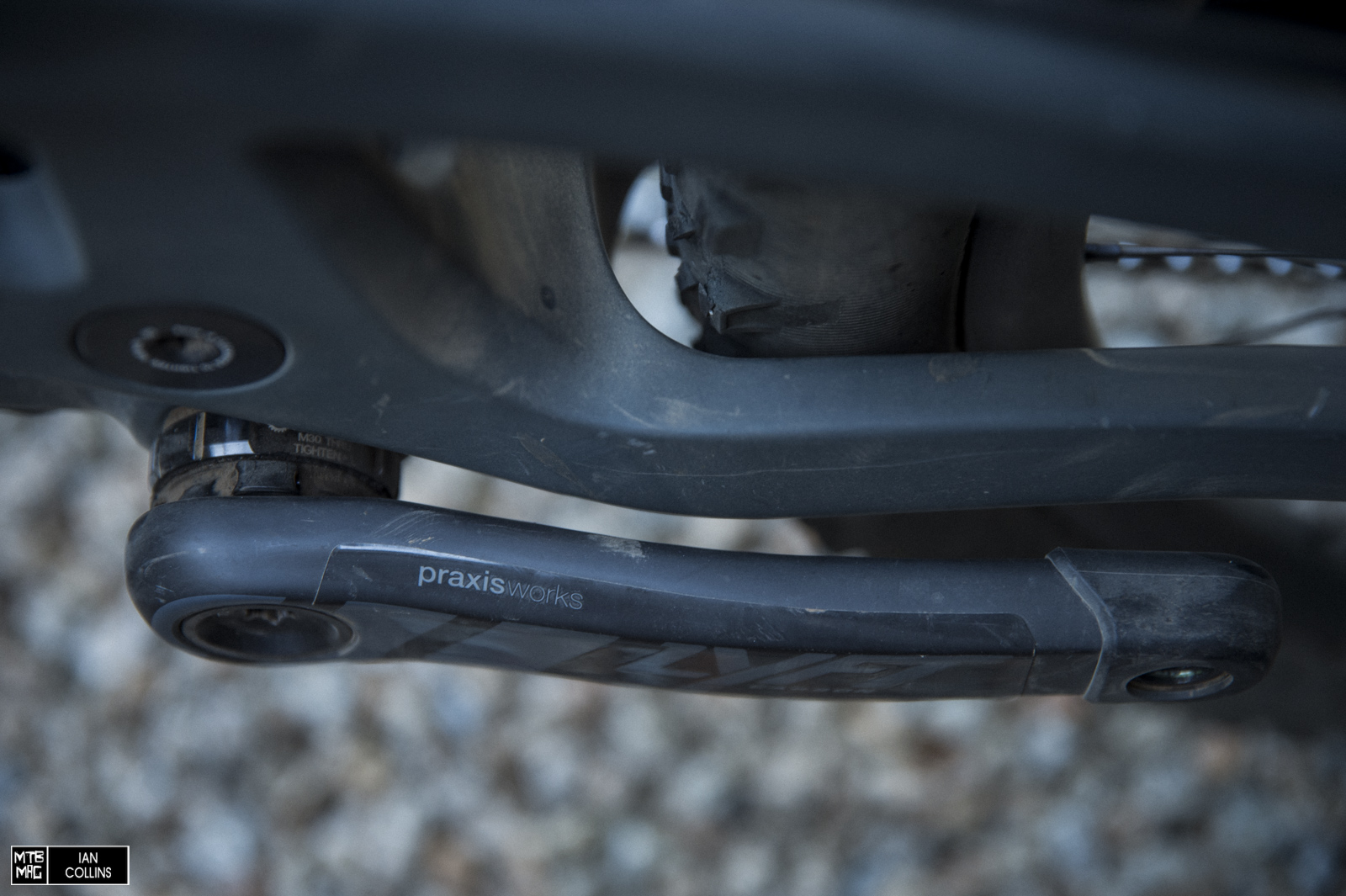
Don’t let the scant weight deceive you, the Lyft crankarms are quite beefy and large in size. Scuff protectors and crank boots come standard to protect your assets from sniper rocks and the occasional, inconsequential crash.
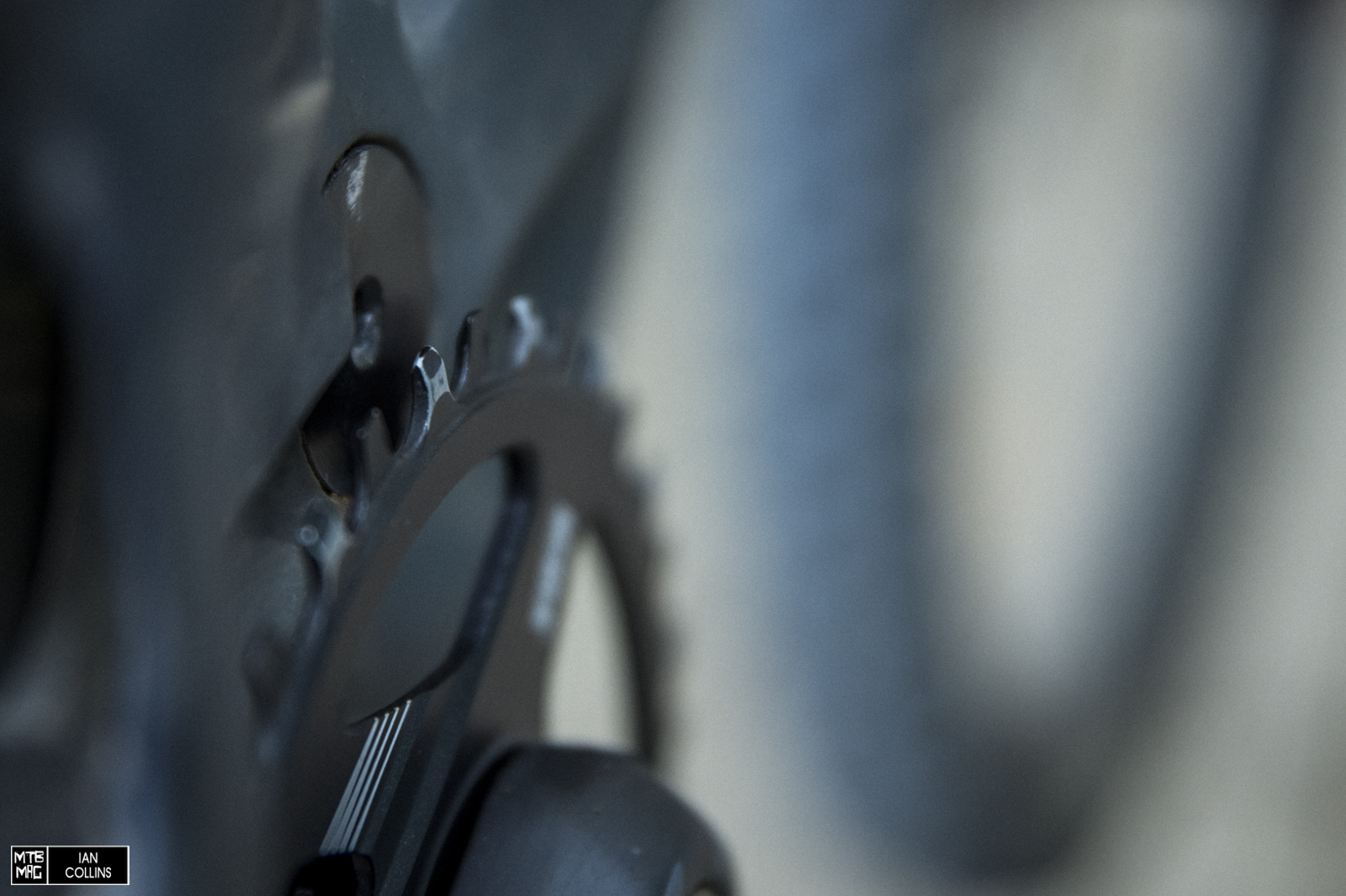
Praxis use “Wave-Tech” chainring technology – a collaborative effort with MRP. Different from traditional narrow/wide and SRAM’s patented X-Sync profile, it utilizes more of an inboard/outboard alternating pattern. According to Praxis, this increases longevity, helps clear mud and also applies more even tension for better retention characteristics. Additional info and diagrams can be seen here.
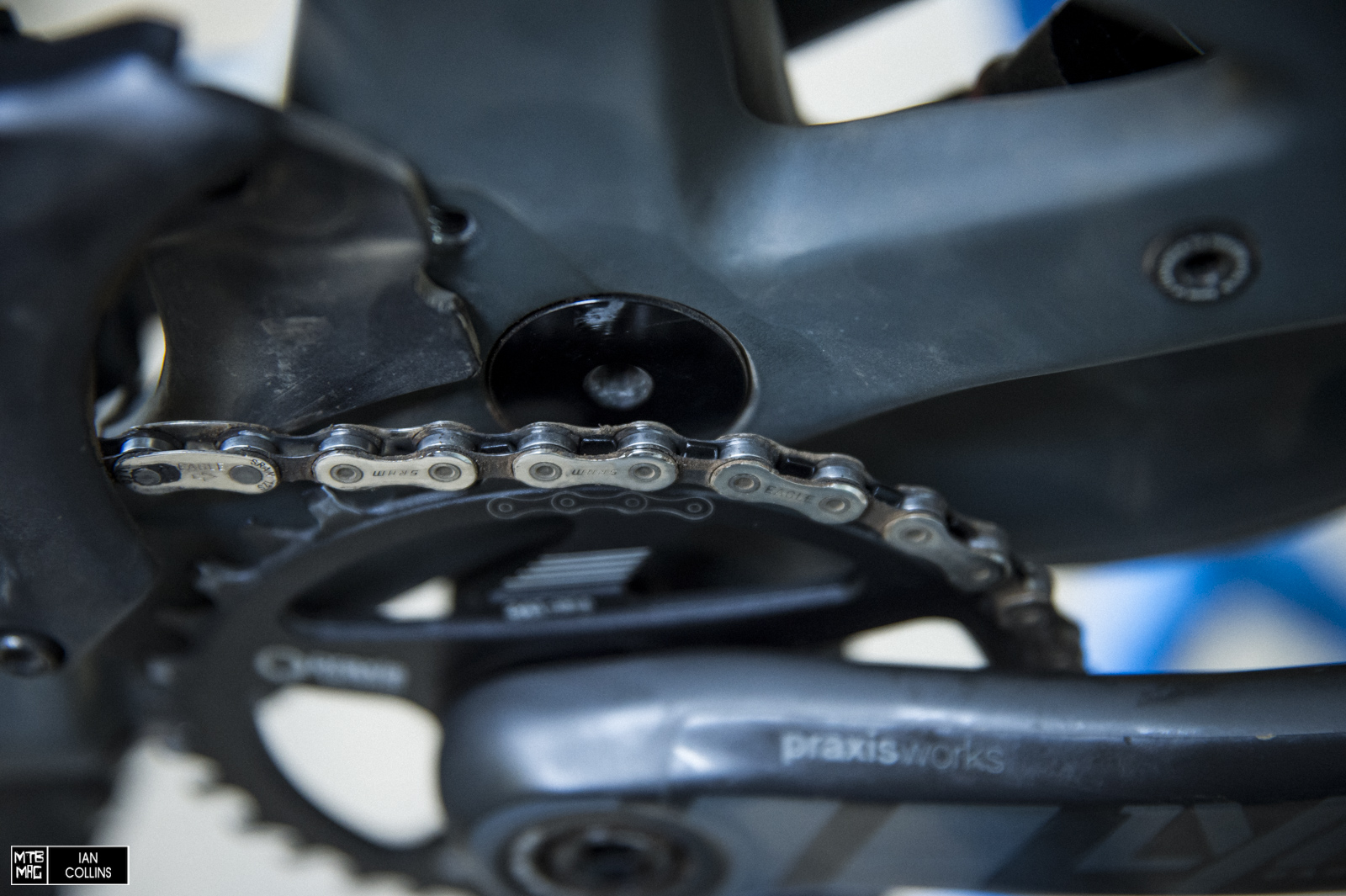
28T-36T chainrings are available; all of which utilize the standard 3-bolt interface that we typically see on SRAM cranks. While the WaveTech rings are available separately in two different offsets (DM-A & DM-B) and do work on some non-Praxis cranks, it’s worth noting that they aren’t cross compatible with every crank/bb/chainline setup. The guide found here should help clarify any compatibility curiosities.
Install/First Impressions
The Lyft was super easy to install, just like most other threaded bottom bracket setups. That’s mainly why we’re always screaming for brands to bring them back. Unlike most threaded setups however, Praxis has a threaded lockring that applies/adjusts tension to the bearings in the BB – much like a BB30 system.
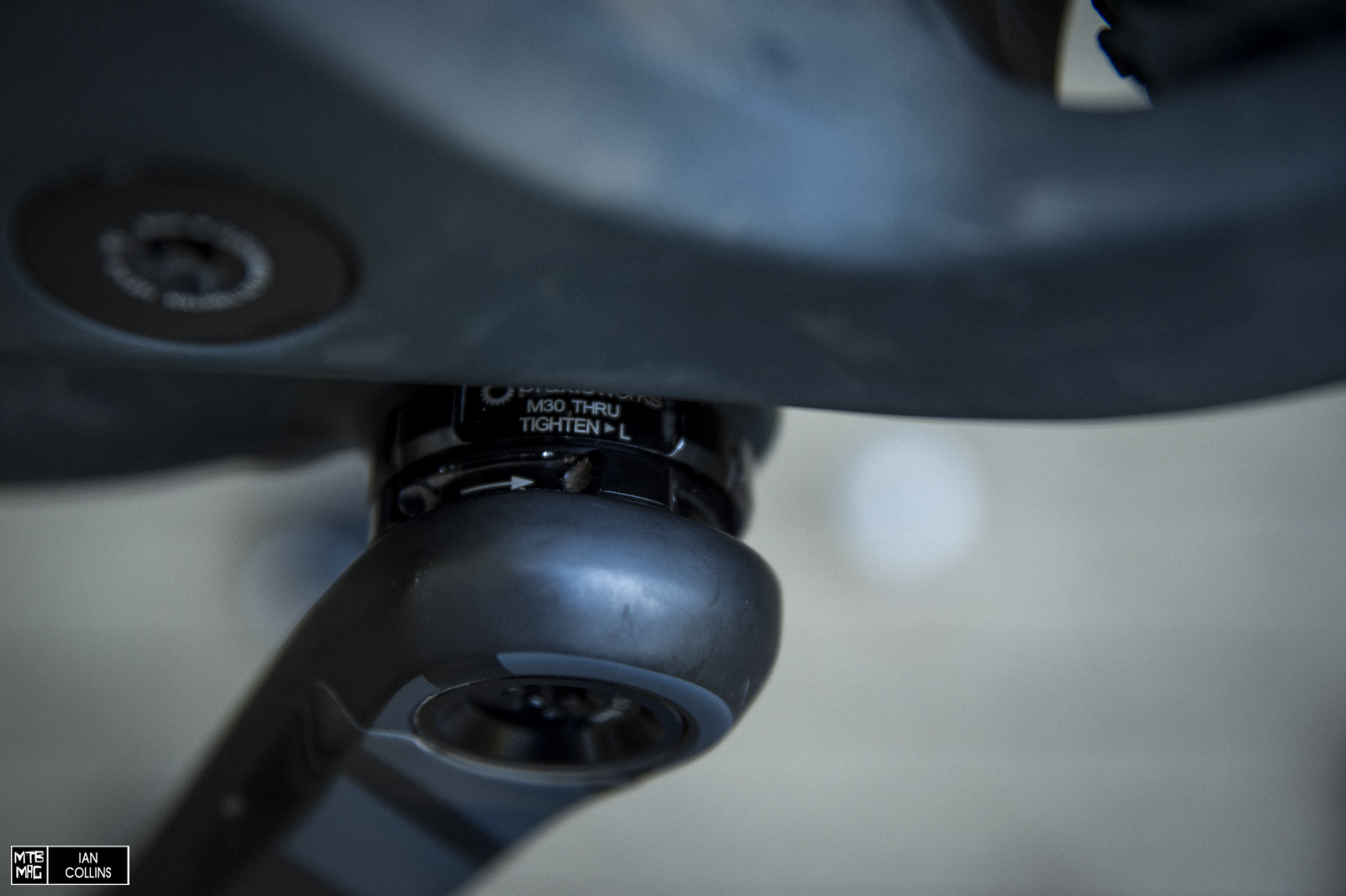
One thing that Praxis did to separate themselves from everyone else was forgo the cheesy plastic lockring and use one made from high quality, machined aluminum instead. Additionally, it uses a slightly more stout 2.5mm allen key so you won’t be stripping it out. While this is one more variable to fuss with, there is a silver lining. Depending on the tolerances of your frame’s BB shell, the BB itself, the crank spindle and the crankarms – quite often, non-adjustable setups can come in over/under spec. This can result in either a touch of play or too much preload on the bearings. This isn’t an issue with Praxis’ setup.

One thing that’s a minor annoyance is that the Praxis BB requires its own tool. Fortunately it’s included, and these days, we’re not all that surprised to see this as more and more brands are doing so. Nevertheless, the install was flawlessly smooth. As expected, the parts were all of the highest quality – finely finished for smooth fitment, rolling on high grade bearings. At this price they’d better be! Let’s see how they rode…
On the Trail
To be completely honest, feeling out ride quality on a crankset is typically a bit cryptic unless they quickly give themselves away as being flexy or rigid. Well, it was the latter in the case of the Lyft, but not overwhelmingly so. Coming off of SRAM’s Eagle XX1 cranks, the Lyft was slightly stiffer, but it did take some time until we were fully aware of it. Despite the cranks being slightly larger in girth than most, they didn’t rub our ankles any more than anything else we’ve ridden. To rattle off some places we rode the Lyft crankset, this trail and this DH track come to mind, but we also rode them on some super rocky stuff in Noble Canyon as well. Overall, power transfer and stiffness surpassed expectations for a crankset this light.

As for the performance of the BB and chainring, both were worthy of high marks. The chainring was at least up to par with any narrow wide/X-sync ring we’ve used in the past. Gauging how much better it will wear compared to the competition is a bit of a dark art, but we’ve got no complaints. To keep our test legit, we rode our Evil Calling for some time without its built-in upper guide to see how well the chainring kept the chain on and in a half dozen rowdy rides we never lost the chain. The BB is super impressive. It has sustained numerous high pressure hosings and the bearings are still as good as new. While it is an extra step, it is quite a simple one and the idea of being able to tension the bearings has grown on us. The fact that the lockring isn’t made of plastic and uses slightly larger hardware may have helped.
Overall
In the grand scheme of things, these cranks are absolutely top notch. We’ve ridden them really, really hard in places they may not necessarily be intended for despite the fact that they are the lightest crankset that Praxis has on offer. If you are truly reckless, we might recommend the Lyft HD, but that’s not the crankset that we rode and tested. While the standard Lyft comes in at roughly $90 more than a comparable SRAM Eagle XX1 crankset, they aren’t cheap, but they are about 40 grams lighter and come with a very high quality bottom bracket. While they will take a chunk out of your wallet, for the gram counting crowd that’s obsessive about quality and has no qualms about shelling out coin, the Lyft crankset is virtually flawless.






















































